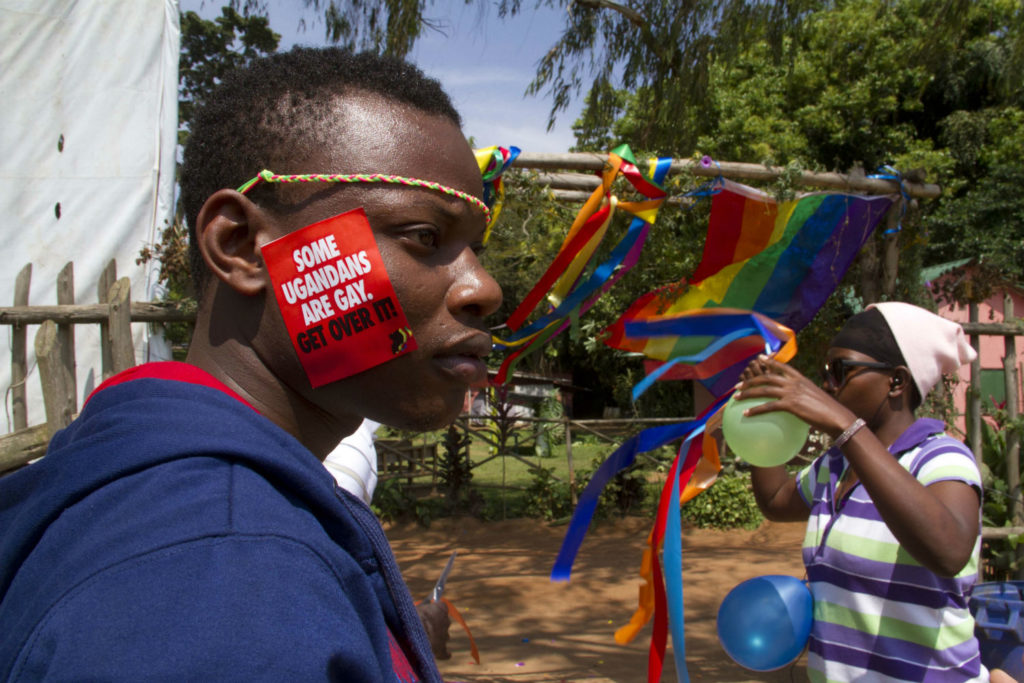Around 23 LGBT+ people in Uganda were whipped by officials before being chained and walked to the police station, disturbing footage shows. (Screen capture via YouTube)
The 20 LGBT+ people in Uganda arrested under dubious coronavirus charges – where a municipal mayor canned them before officers chained and marched them to a police station – have taken legal action against the authorities.
Harrowing footage emerged of a March 29 raid which led to the arrest of around 20 LGBT+ harried Ugandans, part of a slew, activists say, of targeted attacks by law enforcement against the community.
The 16 queer men and four trans women, all homeless, were swept up in a sudden police raid at a shelter in Kampala, the country’s capital, in an attack which has come to capture the level of impunity felt by anti-LGBT+ forces in Uganda to carry out such attacks.
After the prisoners spent almost 50 days on remand without access to legal counsel for the first 42, a top local human rights organisation has launched a lawsuit against Ugandan authorities, claiming the group suffered “cruel and inhuman” torture in prison.
Twenty LGBT+ people in Uganda arrested on COVID-19 charges allege weeks of ‘taunting, flogging and scalding’.
All were outside the building after Uganda’s president, Yoweri Museveni, issued shelter-in-place orders. The group had nowhere else to turn, they said.
Prosecutors did not charge the group with the country’s barbed anti-LGBT+ laws. Instead, they were charged with disobeying coronavirus regulations on social distancing – part of a new playbook of autocratic authorities exploiting the pandemic to hastily push authoritarian laws and persecute marginalised and vulnerable groups.
Today, @hrapf_uganda filed a suit against the LC 3, Kyengera Town Council and the Deputy Officer in Charge of Kitalya Prison for acts of torture at the arrest and detention of the #COSF-20 during the time of the COVID -19 lockdown. @jjuukoa gives a brief account of the case. pic.twitter.com/f7zTYE66MO
— hrapf (@hrapf_uganda) July 21, 2020
Human Rights Awareness and Promotion Forum (HRAPF) filed the suit Tuesday (21 July) against Local Council Three mayor Hajji Abdul Kiyimba, the Kyengera Town Council and the Kitalya Prison’s deputy officer Philimon Woniala.
In a press release, the group decried the “myriad of forms of violence, ranging from taunting, flogging, scalding, subjection to corporal punishment, as well as denial of access to food, sanitary facilities and medication.”
In one alarming instance, a senior official ordered one of the queer youths to strip naked before brining him with a piece of firewood between his thighs, they claimed.
Moreover, the release continued, HRAPF were stonewalled from giving the group legal advice – prison officials only gave the inmates access after a High Court judge ruled that depriving the inmates of a lawyer was illegal.
“The fact that they were remanded to prison at the height of the COVID-19 crisis exposed them further to COVID-19 and exacerbated the already congested conditions in prison. Prisons need to be decongested rather than further congested at a time like this,” said Dr Adrian Jjuuko, HRAPF’s executive director, said in the release.
Ugandan lawmakers lobbied for parliament to introduce the death penalty for homosexuality.
HRAPF took aim at Uganda’s stringy execution of torture-prevention policy drawn-up by United Nations officials, saying that the Prevention and Prohibition of Torture Act 2012 is scarcely implemented by law enforcement.
The policy, they said, almost veils the undercurrent of torture executed by law enforcement in the county, where cases of torture rose by 13 per cent in 2018, according to a report by the Ugandan Human Rights Commission.
Indeed, president Museveni, 72, signed the draconian Anti-Homosexuality Bill in February 2014.

The law called for repeat offenders to be sentenced to 14 years in prison and to make it a criminal offence not to report someone for being gay.
Ultimately, the country’s Constitutional Court later struck down the bill, finding that the speaker of parliament acted illegally by moving ahead with a vote on the law despite at least three lawmakers objecting to a lack of quorum.
But rumours swelled last year of the bill’s return, as lawmakers began lobbying for parliament to get the measure tabled and passed by the end of the year.
Not only did the revamped bill allegedly mandate the death penalty for gay people, but it would also have criminalised anyone involved in “promotion and recruitment” of homosexuality, according to the country’s ethics and integrity minister.
While the president’s representatives stamped out speculation by saying there were “no plans” to introduce the bill, it nevertheless rattled the country’s already withered down LGBT+ activists.
